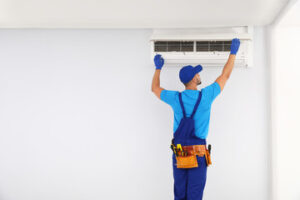Learn About HVAC Systems For Your Home Or Business
There are several types of HVAC systems, each of which combines design, installation, and control systems. For small buildings, contractors may perform an initial capacity analysis and design, selecting the appropriate refrigerant and components. Building service designers and mechanical engineers analyze and design HVAC systems, and specialty mechanical contractors and suppliers fabricate and install systems. For all types of buildings, building permits and code compliance inspections are necessary before construction. Learn about HVAC systems to keep your home and business comfortable.
Mechanical ventilation uses mechanical systems to move air inside and outside a building. Old-fashioned homes incorporate plenty of natural ventilation, but modern homes are usually tightly sealed. In this case, mechanical ventilation is required to prevent moisture condensation within the HVAC system. For more information on HVAC systems, click the links below:
Heating and cooling systems require regular maintenance. In fact, lack of maintenance is one of the leading causes of system repair. Ensure your system works properly before the heating and cooling seasons to avoid unexpected repairs. If you’re not sure what kind of maintenance your HVAC system needs, contact a local HVAC company that specializes in your particular system. Alternatively, if you’re unsure, check the manual provided by the manufacturer. HVAC technicians are able to recommend a system suited for your home.
HVAC technicians can be self-employed or hired by a commercial firm. These technicians must be flexible and able to work on multiple jobs and in various types of weather conditions. They must be trained to safely handle the equipment and avoid electrocution. Some technicians may be required to climb ladders and crawl through narrow spaces. Those who specialize in HVAC work also need to have specialized training. This means having several certifications. HVAC technicians must be licensed to install and repair equipment.
Apprenticeships are another option. Apprenticeship programs in HVAC often last between three and five years. Students can work for an employer and gain hands-on experience in the industry. The training is free, but apprenticeships are often unpaid, and employers are usually more likely to pay apprentices who can prove themselves in a trial period. In some cases, employers require certification in order to hire technicians. These certifications will help employers determine your skills and experience and make you more valuable.
Air filtration is a crucial component of HVAC systems, as they remove pollutants and humidity from the air. By properly filtering the ventilation air, HVAC technicians can reduce the risk of mold. Some HVAC systems use CO2 sensors to detect and respond to these changes. They also monitor the outside air humidity levels to control mold and moisture. If you don’t want your school to be overly humid, you can install a variable occupancy HVAC system. Just make sure to calibrate and maintain your CO2 sensors.
The HVAC system has three main functions: to provide acceptable indoor air quality, thermal comfort, and environmental comfort. They are generally complex and extensive and are prone to breakdown. HVAC systems consist of nine parts, including the air return, filter, ducts, electrical elements, outdoor unit, and coils. There are a number of different ways in which HVAC systems can malfunction, and you must be familiar with all of them before you can repair them.
While most homeowners know what HVAC stands for and what HVAC systems are, many have never replaced or purchased a new HVAC system. Many have even never had to install a new HVAC system. While most of us understand the basic processes of these systems, we often don’t know how they work. HVAC systems, also known as heat pumps or central air conditioners, utilize indoor air handler units. The indoor air handler unit contains the furnace and cooling components, while the outdoor condenser is located outside.
While most states do not require specialized HVAC licenses, many employers require post-secondary training to ensure that you can handle all aspects of a complex system. The curriculum includes hands-on training, basic electricity, motors, and refrigeration, duct design, troubleshooting, and more. These courses are designed to teach you everything you need to know to become an HVAC technician.
An HVAC system typically includes an air conditioner and a heat pump. The heat pump, on the other hand, uses an electric motor to generate heat. It is usually paired with a gas or electric furnace. The primary function of these HVAC systems is to move warm air from the outdoor unit to the indoor one. Moreover, these systems can also help maintain a home’s indoor air quality. The heat pump also uses electricity to make the indoor temperature more comfortable.
